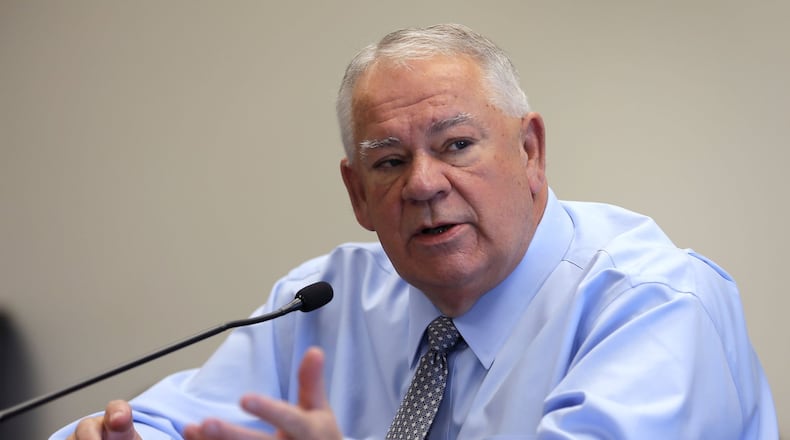House Speaker David Ralston is pushing for the Georgia General Assembly to avoid contentious debates this year over "religious liberty" and Confederate monuments, saying lawmakers should instead focus on adoptions, public transportation and rural needs.
Ralston, speaking to the news media before the Legislature starts its annual session Monday, said his first priority is quick action to pass a measure that would speed up the state’s adoption process.
Complete Georgia legislature coverage
Top issues for the Georgia General Assembly in 2018
Top players in the Georgia Legislature
Five newcomers to watch at the Georgia Capitol
How to follow this year's Georgia Legislature
Get involved and take action in Georgia politics
Will election year keep Ga. lawmakers away from controversial issues?
A wide range of health care woes face Georgia Legislature this year
In preparing next Georgia budget, Deal faces many challenges
The adoption legislation failed to advance last year after senators amended it to allow adoption agencies to refuse to serve anyone based on religious grounds. Critics of the move said it would give faith-based adoption agencies a license to deny children to same-sex couples, someone who had been previously divorced or couples of different religions
If the adoption bill stalls, so could other legislation.
“I was very disappointed that bill didn’t pass last session,” he said Thursday. “We lost an opportunity to modernize and expedite our process here in Georgia and get kids out of the foster system and into permanent, stable, loving homes quicker. … That’s something we need to do — and do it quick.”
He said he hopes election-year politics don't derail the Legislature. Four Republican candidates for governor have signed a pledge to sign religious liberty legislation into law if elected, including Lt. Gov. Casey Cagle, the president of the Senate.
“If we’re going to take off every other year for people to run for office, then maybe we just ought not have a session in an election year,” Ralston said. “I’ll talk to the public and encourage them to be in touch with these people and tell them we really do need to get to work here.”
Cagle has previously said he doesn’t want religious liberty debates to hinder adoption legislation during this year’s legislative session.
The General Assembly will likely discuss state governance of many disconnected local public transportation agencies, both in metro Atlanta and outlying areas, Ralston said. Along with state oversight, legislators are also considering whether to dedicate state funding for transportation infrastructure.
Rural Georgia could take center stage among lawmakers who have been trying to rejuvenate business growth in long-suffering regions.
Ralston said he supports building high-speed internet and improving health care access in rural areas, but many details still have to be negotiated. Ralston objected to direct funding for internet companies, but he was open to the state providing incentives for internet construction in sparsely populated areas.
He said he wants to avoid controversial legislation, such as a proposal to allow local governments to relocate Confederate monuments. Those kinds of efforts could damage the state’s strong business reputation, he said.
“I respect that people on both sides have strong feelings about historical monuments, but we’ve got a lot going on in Georgia,” Ralston said. “We’re doing pretty darn well, and I want to keep moving forward.”
Democrats, who make up about one-third of the Georgia Legislature, are putting their emphasis on health care, said House Minority Leader Bob Trammell, D-Luthersville.
They're seeking an expansion of Medicaid — the state-federal health care program for the poor and disabled — that's allowed under the Affordable Care Act, a nonstarter with many Republicans.
Instead, Ralston and Republicans are considering Medicaid waivers, which could bring more flexibility and funding to the state. In other states, waivers have allowed people on Medicaid to buy private health insurance or to require them to pay modest premiums.
“The No. 1 priority for our caucus is Medicaid expansion,” Trammell said. “We have 600,000 Georgians that could have coverage if we opted to expand.”
About the Author





